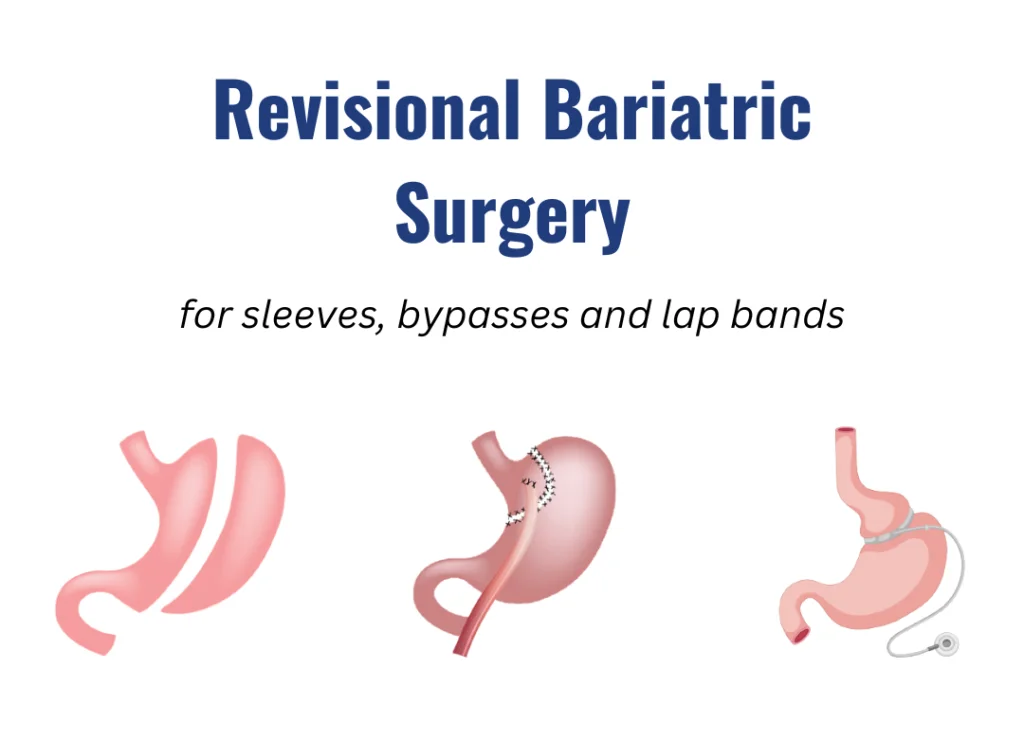Bariatric Revision Surgery
If you have previously undergone bariatric surgery but are struggling with weight regain, insufficient weight loss, or complications like GERD/reflux, bariatric revision surgery may be the solution to help you achieve the results you initially hoped for. Dr. Amit Taggar, a leader in the field of bariatric surgery, specializes in all types of revision surgeries to help patients get back on track with their weight loss journey. Learn how Dr. Taggar, a world-renowned specialist in bariatric surgery, is using cutting-edge technology to help patients safely and effectively regain control over their health.

Why Would You Need a “Bariatric Revision Surgery”?
Bariatric revision surgery is often recommended when the original bariatric surgery does not lead to the desired outcomes or causes complications. Here are the primary reasons patients consider a revision:
- GERD/Reflux After Gastric Sleeve
- Up to 25% of patients who undergo Sleeve Gastrectomy may develop GERD (gastroesophageal reflux disease) or significant heartburn. This condition can be difficult to manage and significantly affect quality of life.
- The most effective revisions for these patients are either a Gastric Bypass (Roux-en-Y) or a Single Anastomosis Gastric Bypass (SADI/SGB). These procedures help reduce reflux by rerouting the stomach and changing the way digestive juices are handled.
- Inadequate Weight Loss or Weight Regain
- Some patients may not achieve sufficient weight loss or may experience weight regain after their initial procedure. This is a common reason why patients consider revision surgery.
- For these patients, the best options include the Duodenal Switch (BPD/DS) or Single Anastomosis Duodenal Switch (SADI), both of which provide a greater degree of restriction and malabsorption to enhance weight loss. In some cases, a Single Anastomosis Gastric Bypass can also be considered as an effective revision.
Common Types of Bariatric Revision Surgeries
Dr. Amit Taggar performs a wide range of bariatric revision surgeries to address issues related to inadequate weight loss or complications. Here are some of the most common types of revisions:
- Sleeve Revision
- Sleeve Gastrectomy is the most commonly performed bariatric surgery worldwide, but unfortunately, up to 20% of patients may need a revision. Reasons for revision can include GERD, weight regain, or insufficient weight loss. Depending on the condition, the revision options include Gastric Bypass, SADI, or Duodenal Switch.
- Gastric Banding Revisions
- Gastric Banding, also known as Laparoscopic Adjustable Gastric Banding (LAGB), was once a popular bariatric surgery but has become largely obsolete due to complications and suboptimal long-term outcomes. Dr. Amit Taggar no longer performs the banding surgery but does offer revisions for patients who had the procedure in the past and are now struggling with weight regain or other issues.
- These patients may be revised to Gastric Bypass, Sleeve Gastrectomy, or Duodenal Switch depending on their needs and current health.
- Roux-en-Y Gastric Bypass Revisions
- While Roux-en-Y Gastric Bypass is generally highly effective, some patients may experience weight regain or develop issues that require revision. SADI or Duodenal Switch may be used to further enhance weight loss.
- Obsolete Bariatric Procedures
- Some bariatric surgeries that were previously common, such as Vertical Banded Gastroplasty (VBG) or Gastric Banding (LAGB), are no longer recommended due to complications and poor long-term success. Dr. Amit Taggar provides revision options for these outdated procedures to help patients achieve better, more sustainable outcomes.
Choosing the Right Revision Surgery
The choice of revision surgery depends on the patient’s individual health needs, previous surgeries, and current complications. Dr. Amit Taggar will work with each patient to determine the best course of action, taking into account:
- Reason for Revision: Whether due to complications (such as GERD or reflux) or inadequate weight loss.
- Previous Bariatric Procedure: The original surgery type influences which revisions are possible and most effective.
- Overall Health: Patient health, risk factors, and goals are all considered before deciding on the appropriate surgical revision.
Benefits of Bariatric Revision Surgery
- Improved Quality of Life: Addressing complications like reflux or helping patients lose additional weight can significantly improve their overall health and well-being.
- Increased Weight Loss: Revision surgeries can help patients achieve the level of weight loss they initially hoped for but did not achieve with their first procedure.
- Reduction of Comorbidities: For patients with conditions like type 2 diabetes, high blood pressure, or sleep apnea, effective revision can help reduce or even resolve these comorbidities.
Is Bariatric Revision Surgery Right for You?
If you’re experiencing GERD, weight regain, or didn’t achieve the results you expected from your initial bariatric procedure, it may be time to consider a revision. With Dr. Amit Taggar’s expertise in a range of revision surgeries, you have options to improve your health and achieve the weight loss you desire.
Why Choose Dr. Amit Taggar
Dr. Amit Taggar specializes in all forms of bariatric revision surgeries, helping patients regain control of their health when the initial surgery didn’t provide the intended results. Contact us today to schedule a consultation and discuss how bariatric revision surgery could help you get back on track to a healthier you.


